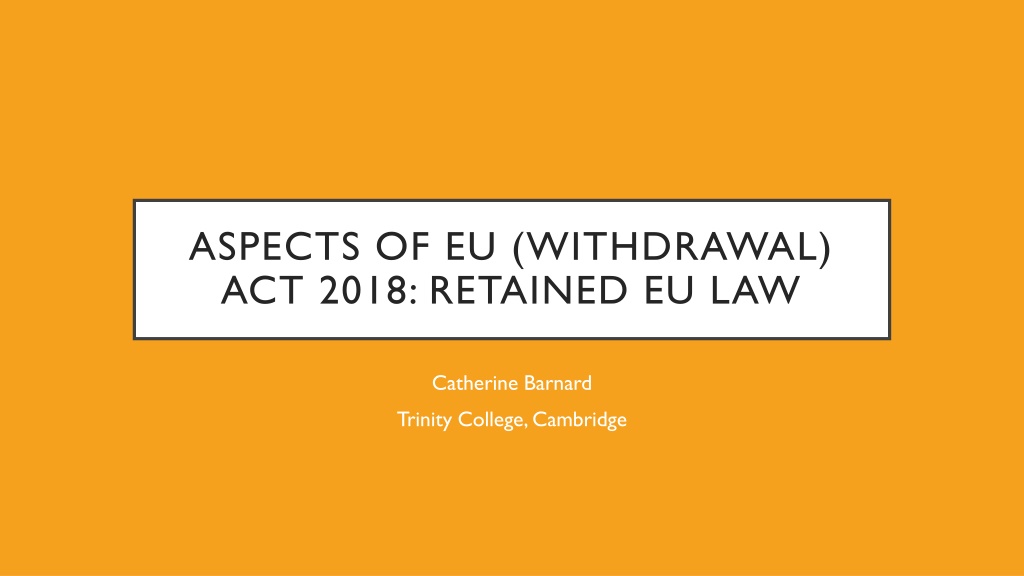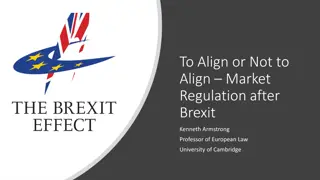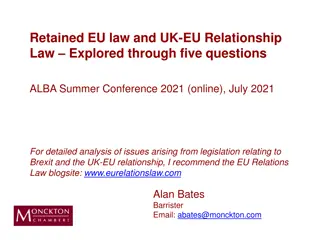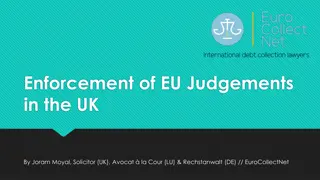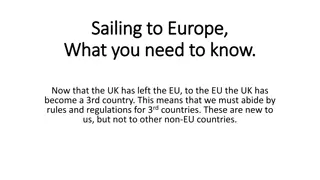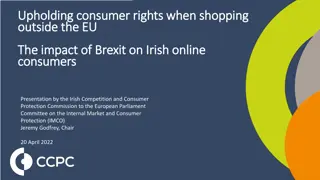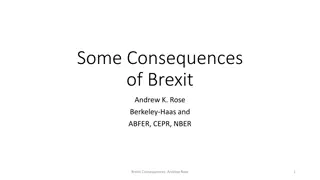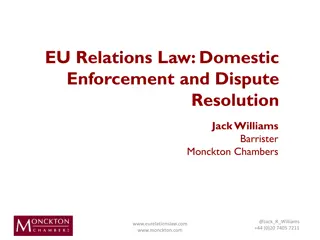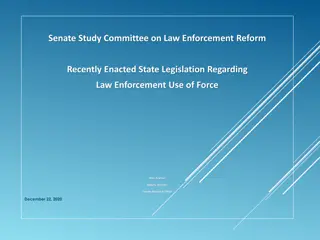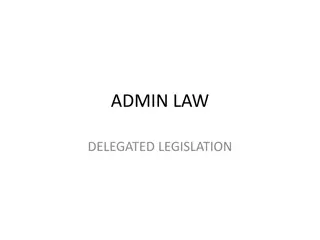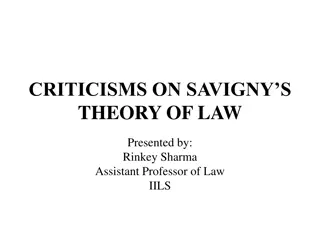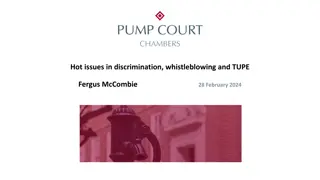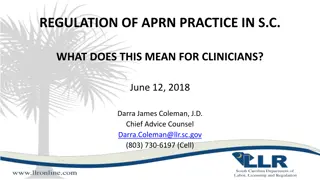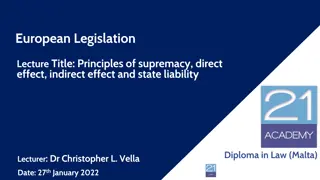Understanding Retained EU Law and Legislation Post Brexit
Explore the implications of the EU Withdrawal Act 2018 on retained EU law, including preserved, converted, and EU-derived domestic legislation. Learn about the interpretative role, general principles, and case law retention, as well as the conversion of Direct EU legislation into domestic law. Understand the concept of retained EU law and its significance in the post-Brexit legal landscape.
Download Presentation

Please find below an Image/Link to download the presentation.
The content on the website is provided AS IS for your information and personal use only. It may not be sold, licensed, or shared on other websites without obtaining consent from the author. Download presentation by click this link. If you encounter any issues during the download, it is possible that the publisher has removed the file from their server.
E N D
Presentation Transcript
ASPECTS OF EU (WITHDRAWAL) ACT 2018: RETAINED EU LAW Catherine Barnard Trinity College, Cambridge
SECTION 6(7) EU(W)A 2018 EU(W)A 2018 (3) Retained general principles of EU law (2) Retained case law (1) Retained EU law Retained EU case law Interpretative role only preserved converted Retained domestic NB this does not apply to the Charter (although cf I- NIP)
RETAINED EU LAW(AFTER IPCD) Retained EU law (s6(7)) Preserved legislation or EU-derived domestic legislation (s.1B(7)) Converted legislation Other primary and secondary leg with the same purpose as regs under s.2(2) eg Regs under HASAWA Direct EU legislation as it applies with adaptations to the EEA Directly effective rights Other domestic legislation Direct EU legislation (s.3(2) EU(W)A 2018) Regs under s.2(2) ECA EU regulations EU decisions EU tertiary legislation s. 2 saves this legislation and carries it over s. 4 converts this s. 3 converts this into domestic law
S.1B(7) EU-DERIVED DOMESTIC LEGISLATION In this Act EU-derived domestic legislation means any enactment so far as (a) made under section 2(2) of, or paragraph 1A of Schedule 2 to, the European Communities Act 1972, (b) passed or made, or operating, for a purpose mentioned in section 2(2)(a) or (b) of that Act, (c) relating to (i) anything which falls within paragraph (a) or (b), or (ii) recognised and available in domestic law by virtue of section 2(1) of the European Communities Act 1972, or any rights, powers, liabilities, obligations, restrictions, remedies or procedures which are (d) relating otherwise to the EU or the EEA, but does not include any enactment contained in the European Communities Act 1972 or any enactment contained in this Act or the European Union (Withdrawal Agreement) Act 2020 or in regulations made under this Act or the Act of 2020.]
CONVERTED LEGISLATION S.3 S.3(1) Direct EU legislation, so far as operative immediately before exit day [IP completion day], forms part of domestic law on and after exit day [IP completion day]. S.3(2) In this Act direct EU legislation means (a) any EU regulation, EU decision or EU tertiary legislation, as it has effect in EU law immediately before exit day [IP completion day] Eg Passenger Rights Reg 261/2004; effects in EU law before IPCD
LIPTON V BA CITY FLYER [2021] EWCA 454 Reg 261/04 operative prior to IPCD so continues to have force in UK law under s.3(1) S.5(2) apply on or after exit day [IP completion day] so far as relevant to the interpretation, disapplication or quashing of any enactment or rule of law passed or made before exit day [IP completion day] Accordingly, the principle of the supremacy of EU law continues to [62] This means that so far as Regulation 261/04 is concerned the doctrine of supremacy applies. It therefore applies and takes precedence over any other measure of domestic law which might be inconsistent.
TREATY PROVISIONS S. 5(2) supremacy continues Directly effective rights in Treaties that can be relied on directly in court by an individual will continue eg Art. 157 TFEU? Backstop? Constitutional check? But always subject to Section 7 (status of retained EU law, esp. s.7(2) ff)
SECTION 4(2): DIRECTIVES (2) Subsection (1) does not apply to any rights, powers, liabilities, obligations, restrictions, remedies or procedures so far as they (a) form part of domestic law by virtue of section 3 , [...]2 , or ]2(b) arise under an EU directive (including as applied by the EEA agreement) and are not of a kind recognised by the European Court or any court or tribunal in the United Kingdom in a case decided before [IP completion day]3 (whether or not as an essential part of the decision in the case).
RETAINED CASE LAW Retained case law Retained domestic case law Retained EU case law Principles/decisions laid down by UK ct or tribunals before IPCD Principles/decisions of European Court before IPCD (a) relate to anything to which section 2, 3 (b) are not excluded by section 5 or (a) relate to anything to which section 2, 3 (b) are not excluded by section 5 or section 2, 3 or 4 section 5 section 2, 3 or 4 section 5 section 2, 3 or 4 or 4 applies, and Schedule 1 Schedule 1 section 2, 3 or 4 or 4 applies, and Schedule 1 Schedule 1
POST BREXIT CASE LAW S. 6(1) deals with interpretation of retained EU law UK (GB) cts are not: bound by any decisions of ECJ (s 6(1)(a)) cannot refer any matter to the European Court on or after IPCD (s 6(1)(b)); BUT Art. 12(4) NIP Part II WA Art. 158 WA BUT a court may have regard to anything done on or after Brexit day by the European Court so far as is relevant to any matter before the court or tribunal (s 6(2)) ( non-binding persuasive effects Lipton [65]) NB Art 13(2) NIP: Notwithstanding Article 4(4) and (5) of the Withdrawal Agreement, the provisions of this Protocol referring to Union law or to concepts or provisions thereof shall in their implementation and application be interpreted in conformity with the relevant case law of the Court of Justice of the European Union.
PRE-BREXIT CASE LAW Section 6(3) Any question as to the validity, meaning or effect of any retained EU law [defined in s.6(7) ie anything part of domestic law under ss2, 3 and 4] is to be decided, so far as that law is unmodified on or after [IP completion day]1 and so far as they are relevant to it (a) in accordance with any retained case law [defined in s6(7) as retained domestic and EU case law relating to matters in ss 2, 3 and 4) and any retained general principles of EU law [defined in s. 6(7)], and (b) having regard (among other things) to the limits, immediately before [IP completion day]1 , of EU competences. 1 1 All pre-Brexit case law of the Court of Justice (retained EU case law) and domestic courts handed down prior to Brexit day will continue to be binding on UK (GB) courts and tribunals. (s. 6(3)) Binding like decision of the SCt/High Ct of Judiciary (s.6(4)(a) and (b)) SCt/High Ct of Judiciary can depart from retained EU case law, applying same test used to depart from own case law (s6(5)) and now CA or equivalent (s6(4)(ba)): right to do so see EU(Withdrawal) Act 2018 (Relevant Court) (Retained EU Case Law) Regulations 2020, SI 2020/1525 CA and similar. See TuneIN [2021] EWCA Civ 441
TUNEIN 74. Furthermore, 24 of the 25 judgments and orders of the CJEU listed in paragraph 67 above constitute retained EU case law (section 6(7) of the 2018 Act), meaning that they continue to form part of domestic law post-Brexit and continue to bind lower courts: section 6(3) of the 2018 Act. The Court of Appeal and the Supreme Court have power to depart from such judgments and orders, but only on the same basis that the Supreme Court has power to depart from one of its own precedents or of one of the House of Lords in accordance with the Practice Statement (Judicial Precedent) [1966] 1 WLR 1234: section 6(5A) of the 2018 Act and the European Union (Withdrawal) Act 2018 (Relevant Court) (Retained EU Case Law) Regulations 2020 (SI 2020/1525). 75.In the domestic context both the House of Lords and the Supreme Court have consistently stated that this is a power to be exercised with great caution. As Lord Bingham of Cornhill said in Horton v Sadler [2006] UKHL 27, [2007] 1 AC 307 at [29] in a passage cited as continuing to be applicable by Lord Wilson in Peninsula Securities Ltd v Dunnes Stores Ltd (Bangor) Ltd [2020] UKSC 36, [2020] 3 WLE 521 at [49] (two decisions in which the power was exercised): Over the past 40 years the House has exercised its power to depart from its own precedent rarely and sparingly. It has never been thought enough to justify doing so that a later generation of Law Lords would have resolved an issue or formulated a principle differently from their predecessors.
(3) RETAINED GENERAL PRINCIPLES
SECTION 5 EU(W)A 2018 (4) after exit day [IP completion day]. The Charter of Fundamental Rights is not part of domestic law on or (5) after exit day [IP completion day] in accordance with this Act of any fundamental rights or principles which exist irrespective of the Charter (and references to the Charter in any case law are, so far as necessary for this purpose, to be read as if they were references to any corresponding retained fundamental rights or principles). Subsection (4) does not affect the retention in domestic law on or (6) and incorporation) has effect Schedule 1 (which makes further provision about exceptions to savings
SCHEDULE 1, PARAS 2 AND 3 2 No general principle of EU law is part of domestic law on or after exit day [IP completion day] if it was not recognised as a general principle of EU law by the European Court in a case decided before exit day [IP completion day] (whether or not as an essential part of the decision in the case). 3 (1) There is no right of action in domestic law on or after exit day [IP completion day] based on a failure to comply with any of the general principles of EU law. (2) No court or tribunal or other public authority may, on or after exit day [IP completion day] (a) disapply or quash any enactment or other rule of law, or (b) quash any conduct or otherwise decide that it is unlawful, because it is incompatible with any of the general principles of EU law.
